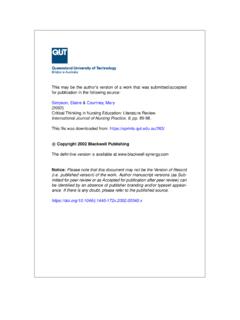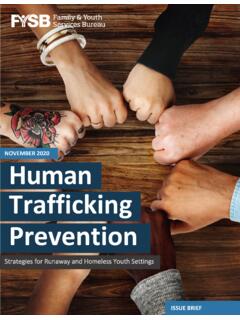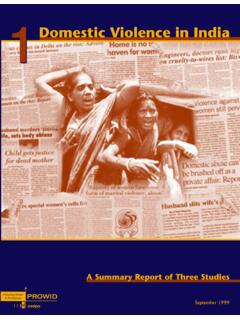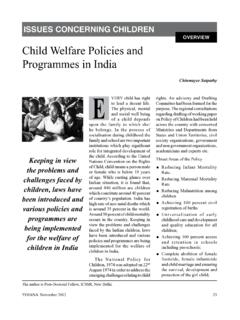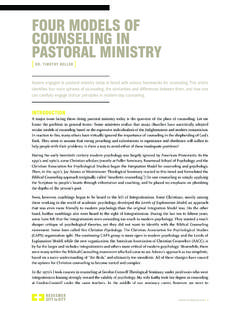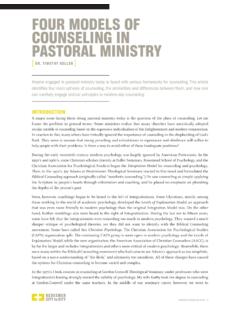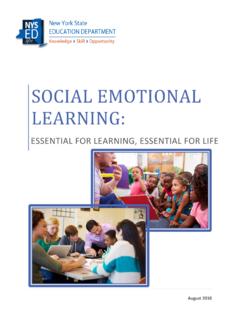Transcription of THE SYSTEMS THEORY FRAMEWORK OF CAREER …
1 THE SYSTEMS THEORY FRAMEWORK OF CAREER DEVELOPMENT AND counseling : CONNECTING THEORY AND PRACTICE Wendy Patton1 and Mary McMahon2, Patton, Wendy and McMahon, Mary (2006) The SYSTEMS THEORY FRAMEWORK Of CAREER Development And counseling : Connecting THEORY And Practice. International Journal for the Advancement of Counselling 28(2):pp. 153-166. Copyright 2006 Springer Key words: SYSTEMS THEORY , CAREER counseling , CAREER THEORY , counseling THEORY Abstract The practice of CAREER counseling has been derived from principles of CAREER THEORY and counseling THEORY . In recent times, the fields of both CAREER and counseling THEORY have undergone considerable change. This article details the move toward convergence in CAREER THEORY , and the subsequent development of the SYSTEMS THEORY FRAMEWORK in this domain. The importance of this development to connecting THEORY and practice in the field of CAREER counseling is discussed.
2 SYSTEMS THEORY has been proposed as a potential overarching FRAMEWORK for dealing with many issues in human behavior. Contributors to SYSTEMS THEORY have come from many diverse fields, including physics (Capra, 1982), biology, anthropology and psychology (Bateson, 1979). The work on living SYSTEMS by D. Ford (1987) and M. Ford and D. Ford (1987) has served to develop an integrated FRAMEWORK of human development and has furthered the development and understanding of SYSTEMS THEORY . Developmental SYSTEMS THEORY (DST, D. Ford & Lerner, 1992) and Motivational SYSTEMS THEORY (MST; M. Ford, 1992) have illustrated the applicability of SYSTEMS THEORY principles to human behavior. Patton and McMahon (1999, 2006) have extended the utility of SYSTEMS THEORY in their application of it as a metatheoretical FRAMEWORK for CAREER THEORY , and as a guide to redefine CAREER counseling practice.
3 The field of CAREER development, as with many other fields of psychology, is characterized by a variable and complex theoretical base. The early thinking by CAREER theorists had ranged from acknowledging the potential of SYSTEMS THEORY in furthering the integration of CAREER THEORY and practice, incorporating aspects of SYSTEMS THEORY into theoretical formulations, to drawing on theoretical frameworks of human development derived from general SYSTEMS THEORY as frameworks within which to further understand specific aspects of human CAREER behavior. Whilst SYSTEMS THEORY had influenced the thinking of CAREER theorists and researchers for over a decade, until the work of Patton and McMahon in 1999 it had not been applied to the provision of an overarching theoretical FRAMEWORK . The SYSTEMS THEORY FRAMEWORK (STF; McMahon, 2002; McMahon & Patton, 1995; Patton, 1997; Patton & McMahon,1999, 2006) is not designed to be a THEORY of CAREER development; rather it is construed as an overarching FRAMEWORK within which all concepts of CAREER development described in the plethora of CAREER theories can be usefully positioned and utilized in THEORY and practice.
4 The SYSTEMS THEORY FRAMEWORK - mapping the origins of CAREER counseling The STF provides a map for understanding the origins of CAREER counseling and the dilemma it is now facing. CAREER counseling is a unique discipline built on a foundation of CAREER THEORY and counseling THEORY . Traditional CAREER THEORY has tended to focus on specific discrete concepts relevant to individual CAREER behavior. In focusing on only one aspect relevant to CAREER decision-making, for example, intrapersonal aspects such as self-concept, others are inevitably undervalued or ignored, and the nature of their interaction almost certainly is. Central to the STF is the individual system within which is depicted a range of intrapersonal influences on CAREER development, such as personality, ability, gender, and sexual orientation. Some of these influences have received considerable attention by CAREER theorists and others have not.
5 As individuals do not live in isolation, the 1 Professor, Queensland University of Technology, Kelvin Grove Campus Queensland, Australia 2 Lecturer, Queensland University of Technology, Kelvin Grove Campus Queensland, Australia individual system is connected with influences that comprise the individual s social system as well as the broader environmental/societal system . While the influence of many factors, such as geographic location and political decisions, on CAREER development is less well understood within the theoretical literature, their influence on CAREER development may be profound. The STF presents CAREER development as a dynamic process, depicted through its process influences, recursiveness, change over time and chance (see Figure 1). Fundamental to understanding the STF is the notion that each system is an open system . An open system is subject to influence from outside and may also influence that which is beyond its boundaries.
6 Such interaction is termed recursiveness in the STF, which in diagrammatic form is depicted by broken lines that represent the permeability of the boundaries of each system . It is well acknowledged that influences on an individual may change over time. The final process influence, chance, is depicted on the STF diagram as lightning flashes, reflecting an increased recognition of the part chance plays in CAREER development. All of the SYSTEMS of influence are located within the context of time - past, present and future - all of which are inextricably linked; past influences the present, and together past and present influence the future. Figure 1. The SYSTEMS THEORY FRAMEWORK of CAREER Development (from Patton & McMahon, 1999) The traditional approach also needed to be understood in the context of time and the world of work when CAREER counseling , then termed vocational guidance, was first developed.
7 At that time, in the early part of the last century, the world of work essentially provided individuals with a job for life, and the predominant issue brought to counseling was that of CAREER choice, usually at school leaving age. Indeed, knowledge about the world of work in order to facilitate CAREER choice also became an essential component of the CAREER counseling process. Thus, CAREER counseling was largely seen as an objective cognitive problem-solving process whereby matching knowledge about self and knowledge about the world of work would result in a sound CAREER choice. This approach to CAREER counseling lent itself comfortably to the use of psychometric assessment of elements of the intrapersonal system of the client, such as ability, personality, self-concept, and/or aptitude. Assessment figured significantly in CAREER counseling , and part of the role of the counselor was to administer assessment instruments, interpret the results, and convey them to the client.
8 Such an approach established CAREER counseling as different from personal counseling . It also portrayed the role of the counselor as one of an expert who would tell a client what to do. It was this approach, termed the trait and factor approach, that dominated CAREER counseling for much of the twentieth century. A changing focus However, the focus on which CAREER counseling is based has changed dramatically. While the elements of the system are the same, their nature and relevance to CAREER counseling are different. In particular, CAREER theories have broadened and new theories have been proposed, and the world of work has undergone dramatic and irreversible change (Brown & Associates, 2002; Patton & McMahon, 1999). In today s world, people change jobs several times in a lifetime, and occupational choice is only one of a myriad of concerns that clients bring to CAREER counselors.
9 CAREER theories need to be appropriate for the complexity of individuals living in a complex world. Traditional CAREER theories have been challenged as being too narrow; new theories have been proposed to encompass elements of the social system and the environmental-societal system and the integration (or convergence) of theories has been debated and explored (Savickas & Lent, 1994). In addition, proponents of the traditional but more narrow theories have acknowledged the influence of elements of the broader system on their clients. Indeed, theorists and practitioners alike have been challenged to be more holistic in their thinking. Proponents of moves toward convergence in CAREER THEORY (Chen, 2003; Savickas ) have emphasized the importance of viewing the whole of CAREER behavior and the relationship between all relevant elements in the CAREER decision-making process to each other and to the whole.
10 In doing so, it is important that contributions from all theories are considered in exploring an individual s CAREER decision-making processes. Thus the theoretical map underpinning CAREER counseling in the 21st century is markedly different from that which existed when CAREER counseling first began. CAREER counseling to date The practice of CAREER counseling has lagged behind that advocated by more recent approaches to both CAREER development THEORY and counseling practice. This is evidenced by the fact that the dominant approach used in CAREER counseling is still the trait and factor approach, with its individual problem-solving focus. A number of writers have emphasized that it is time CAREER counseling was reconstructed to be an effective process in these changing times (Savickas, 2000). Challenges such as the redefinition of CAREER (McMahon, Patton, & Tatham, 2003; Richardson,1996) and the demands being made on CAREER counseling at sociopolitical levels (Organization for Economic Cooperation and Development, 2004) demand a response.







